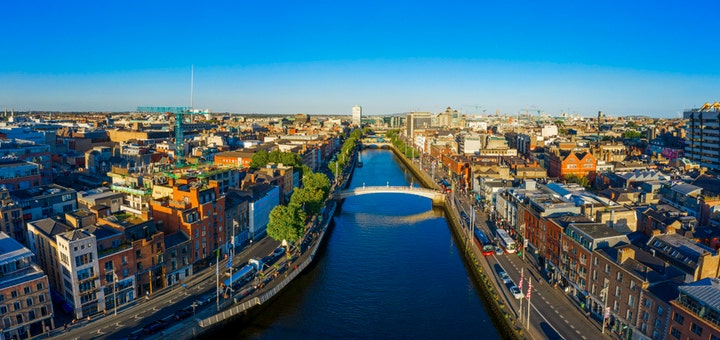
Follow these three principles to guide climate policy, says Salesforce

The company is guided by impressive commitments, but there are questions around how successful it has been so far
Transparency and clarity are critically important when it comes to reporting progress towards climate targets; without them, obfuscation and murk can hide the important work being done - or, worse, not being done. That's why our newest interview for Computing's Tech Impact campaign, with Salesforce's Dr. David Dempsey, is so enlightening, in more ways than one.
Dempsey is county leader and general manager at Salesforce Ireland, and spoke about how the company is contributing to the drive to Net Zero and a more sustainable future.
"Salesforce consider the environment to be a key stakeholder and we are committed to harnessing our culture of innovation to improve the state of the world. From our suppliers and customers to our technology and our brand, we use our biggest levers of influence as change agents in the greatest and most high-stakes challenge ever — the climate emergency. Salesforce believes business is the greatest platform for change, and we are working to play a meaningful role in creating a sustainable, low-carbon future."
Dempsey says Salesforce has deepened its "long" commitment to "ambitious" climate targets, and integrated climate into the Salesforce public policy platform, joining priorities such as equal rights, privacy and security. The climate policy platform is guided by three principles:
The first principle is to reduce emission sources and scale nature-based solutions to reach net-zero emissions by 2050. Salesforce advocates for policies that reduce global emission sources, recently signing up to a 1.5° science-based emission reduction target, and plans to reach 100 per cent renewable energy for global operations this year (2021), as well as operate as a net zero operations company.
The second principle is to reorient economies and financial systems around a net-zero future. By creating clear market-based demand for low-carbon products and services, Salesforce intends to demonstrate the market opportunities offered by the transition to a net-zero carbon future and empower governments, investors, and businesses to consider climate-related risks and opportunities.
The final principle involves an equitable transition to a more resilient society. Salesforce is committed to working with stakeholders to improve society and ensure a just and equitable transition for people and communities to a more resilient net-zero society.
What, when, where, how?
This is all very positive, but on digging a little deeper, questions appear. The first is exactly who is responsible for progress towards these policy goals, like a chief climate officer or head of sustainability. As well as setting the direction for climate developments in a company, these figures can be held up as a visible - and accountable - individual that shows a company is serious about its ESG commitments.
Edit 22/9/21: The question of responsibility was not clear when we talked to Salesforce, but the company has since sent us the following comment:
'To confirm, Salesforce does have a Chief Impact Officer, Suzanne DiBianca, as well as a full sustainability team, which includes Patrick Flynn who is our Vice President, Sustainability.'
The second question concerns reporting - and just how transparent that reporting is. Salesforce ESG reporting currently shows 75 per cent progress towards its 100 per cent renewable energy target. Market-based method emissions reporting means that renewable energy offsets ‘dirty' datacentre emissions - in this case, putting them at net zero. The calculation depends on the purchase of renewable energy via Virtual Power Purchase Agreements (VPPAs), green tariffs and other contractual instruments. Whilst Salesforce's stakeholder report on progress towards public policy targets is available via the company website, the crucial data on how greenhouse gas (GHG) emissions are offset, and the carbon calculations, are considerably harder to locate. If technology companies are serious about their role in stabilising the climate, they really need to lay out the relevant data in a clear and verifiable way.

Salesforce is, to be clear, following the GHG Protocol by reporting on both location and market- based emissions, and the carbon calculations have been independently verified. The problem is that offsetting doesn't stop electricity being consumed from non-renewable sources - and in this case, according to the ESG report, more than 80 per cent of datacentre energy comes from non-renewables. Scope 2 emissions (indirect emissions from purchased energy) are actually slightly higher this year than last, despite business travel, office and commute-based emissions all plummeting. This seems to defeat what should be the point of the exercise.
The extent and quality of renewable energy certificates varies from one provider to another, as does their stance on the reporting of Scope 3 - all other indirect - emissions. Inconsistencies in GHG reporting make it very difficult to properly evaluate the sustainability of prospective suppliers and partners, and the depth of their commitment to environmental issues. It is perhaps partly for this reason that Salesforce has joined calls for companies to be required to publicly disclose independent third-party reviewed emissions information, covering Scopes 1, 2 and 3 (the latter being presently voluntary) as well as emissions reduction goals.
The three Rs
Despite questions around Salesforce's climate targets, the company is undoubtedly making an effort. In addition to climate change and energy consumption, Salesforce's public policy platform covers circular electronics (reuse, refurbishment, remanufacturing), recycling and waste management. Its San Francisco HQ has the largest on-site water recycling system in a commercial high-rise building in the United States.
"Recycling and waste management are vital components of all businesses big and small, and our offices are a physical expression of our values, which is why we integrate green building practices into our real estate strategy," says Dempsey. "The system filters up to 30,000 gallons of water (equivalent to 7.8 million gallons a year) from sinks, toilets and showers every day then safely repurpose it for non-potable uses, like landscaping, our rooftop cooling system, and flushing the bathroom fixtures.
"We are also excited that Salesforce Tower Dublin, in the heart of the Silicon Docks, will soon be our Irish home. This will be one of Ireland's most sustainable office buildings and one of our most sustainable buildings worldwide to date."

Salesforce is keen to encourage both their customers and suppliers to reduce their carbon emissions and contribute towards a more sustainable future.
"We are committed to providing our customers with trusted, actionable, and meaningful Salesforce-related emissions data. In 2020, we launched Salesforce Sustainability Cloud: a carbon accounting product for businesses and governments to track and manage their greenhouse gas emissions.
"Earlier this year, we also unveiled a sustainability exhibit which we now include in new supplier procurement contracts. We see it as an opportunity for collaboration and to start a conversation with our suppliers about how we can support then in their own sustainability and climate action journey."
Computing will run the Tech Impact Conference this year, exploring the relationship between tech and the climate - including case studies about the road to net zero, how to go green in your data centre and supply chain, and how to make small changes with a big impact. For those who are passionate about the planet - and those who are more wary - there has never been a better time to get involved.
You may also like

/news/4338523/tatas-uk-gigafactory-project-takes-major-step-forward
Components
Tata's UK gigafactory project takes major step forward
Sir Robert McAlpine to build multi-billion-pound factory

/podcasts/4333508/national-grid-analogue-digital-ctrl-alt-lead-podcast
Public Sector
National Grid is turning analogue to digital - Ctrl Alt Lead podcast
'We can't do what we've always done, just more efficiently'

/opinion/4332800/peter-cochrane-energy-resources-free
Green
Peter Cochrane: Energy and resources are no longer free
We need new thinking